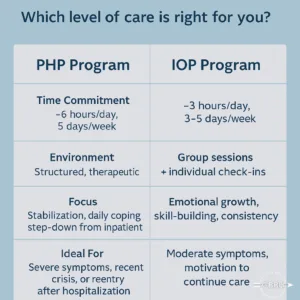You may have stepped away from treatment—mid-program, mid-week, or maybe mid-text response. Now, there’s this quiet itch. A wondering if it’s too late. If you’re allowed to try again. If someone will even take you seriously.
Here’s the truth: You haven’t blown it. And no, you don’t need to “start over.” You just need someone who knows how to meet you right where you are. At Greater Boston Behavioral Health, we work with people who’ve ghosted before. Who paused treatment, walked out, or disappeared entirely. The door isn’t closed. It’s still right here.
This guide will help you figure out what kind of support makes sense now—and how to actually find a provider who gets it.
First: Why You Paused Doesn’t Define You
Before we dive into PHP vs IOP, here’s a quick reality check: leaving treatment doesn’t mean you failed. It doesn’t mean you’re “not serious.” It means you’re human.
Maybe the program didn’t fit. Maybe you were burned out, overwhelmed, or deep in survival mode. Maybe the idea of talking about your feelings in a group made you want to sprint.
You’re not the only one.
And here’s what we know: people come back stronger when they return without shame. Let’s drop the shame—and focus on what will actually help.
PHP or IOP? Here’s How to Know What You Need Now
Let’s keep it simple. PHP (Partial Hospitalization Program) and IOP (Intensive Outpatient Program) are two of the most common types of structured mental health care that don’t require an overnight stay. The right one depends on what your days look like now—not what you “should” be doing.
Choose PHP if:
- Your emotions feel unmanageable more days than not
- You’ve recently been hospitalized or had a mental health crisis
- You’re struggling to stick to routines, sleep, or even leave the house
- You need daily support to feel safe and stable
Choose IOP if:
- You’re working or in school but struggling emotionally
- You want help managing anxiety, depression, or past trauma
- You’re stable but not thriving
- You need structure—but with flexibility
Compare at a Glance: PHP vs IOP
| Feature | PHP Program | IOP Program |
|---|---|---|
| Time Commitment | ~6 hours/day, 5 days/week | ~3 hours/day, 3–5 days/week |
| Environment | Structured, therapeutic, group and individual support | Group sessions + individual check-ins |
| Focus | Stabilization, daily coping, step-down from inpatient | Emotional growth, skill-building, consistency |
| Ideal For | Severe symptoms, recent crisis, or reentry after hospitalization | Moderate symptoms, motivation to continue care |
| Flexibility | Moderate | High |
These aren’t “levels of failure.” They’re options. Tools. You don’t earn your way up or down. You choose what actually fits your now.
Finding a Local Provider Who Gets It (And Doesn’t Punish the Pause)
Let’s be honest: some treatment centers make it awkward to come back. Others act like you have to re-prove yourself. That’s not help. That’s red tape.
At Greater Boston Behavioral Health, we operate differently. We assume you’re here because you want something to feel better. That’s enough.
We don’t ask “why did you leave?” as a condition for return. We ask, “What do you need now?”
Looking for a php program or iop program in Dedham, MA? Our Dedham center welcomes clients who’ve been through this before.
In Needham or Newton? We offer nearby services in Needham and Newton, too. You don’t need a dramatic comeback—just a conversation.
What If You’re Not “Ready”?
Here’s a secret most providers won’t say out loud: nobody’s ever fully ready. Not really.
There’s no magical day where everything feels aligned. Most people walk in with a mix of hope, dread, guilt, and confusion. That’s not resistance. That’s being honest.
So if your inner voice is whispering “maybe,” don’t wait for it to scream “yes.” Maybe is enough to start asking questions. To reach out. To come back in slowly.
Success Doesn’t Look Like You Think
We’ve seen people restart a program five times before it finally clicked. We’ve seen clients walk out mid-week and call again six months later. You’re not off-script. You’re just in process.
Here’s what success can look like:
- Sitting through one full group session after weeks of avoiding it
- Showing up even when your brain told you not to
- Telling someone you’re struggling before it explodes
Progress doesn’t always feel like fireworks. Sometimes, it’s a quiet shift. A single yes.
FAQ: Choosing the Right Mental Health Program After a Pause
What if I already left another program? Will I be judged or turned away?
No. At GB Behavioral Health, we understand that leaving treatment can be part of the healing process—not the end of it. You’re welcome to return or try a different level of care, no matter how things ended last time.
Can I switch from IOP to PHP if I realize I need more support?
Yes. In fact, many clients do. We reassess as you go. If things feel harder than expected, we can help you transition into a higher level of care without delay.
Is it okay if I’m still unsure whether I want to commit fully?
Absolutely. Ambivalence is normal. You don’t need to show up 100% convinced. You just need to show up willing to try again.
What if I can’t attend every day due to work or childcare?
We’ll work with you. IOP programs offer flexibility, and we can help create a schedule that fits your life while still supporting your healing.
Will insurance cover a php program or iop program in Massachusetts?
Most insurance plans do cover both PHP and IOP services. We can verify your benefits and walk you through options before you commit to anything.
You’re Allowed to Come Back
If you’ve been telling yourself “they won’t want me back,” please hear this: we do. We know the courage it takes to even think about returning. You’re not broken. You’re not banned. You’re not behind.
Whether you need the daily structure of a php program or the flexible support of an iop program, help is here—and it’s shaped for your real life, not your idealized one.
Ready to Reconnect?
Call (888) 450-3097 or visit to learn more about our php program, iop program services in Boston, Massachusetts.


